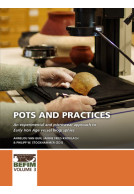Google Books previews are unavailable because you have chosen to turn off third party cookies for enhanced content. Visit our cookies page to review your cookie settings.
Animals in Saxon and Scandinavian England (Paperback)
Imprint: Sidestone Press
Pages: 222
ISBN: 9789088902666
Published: 22nd August 2014
Script Academic & Professional
Pages: 222
ISBN: 9789088902666
Published: 22nd August 2014
Script Academic & Professional
Please note this book may be printed for your order so despatch times may be slightly longer than usual.
You'll be £35.00 closer to your next £10.00 credit when you purchase Animals in Saxon and Scandinavian England. What's this?
+£4.99 UK Delivery or free UK delivery if order is over £40
(click here for international delivery rates)
Need a currency converter? Check XE.com for live rates
(click here for international delivery rates)
Need a currency converter? Check XE.com for live rates
In this book an analysis of over 300 animal bone assemblages from English Saxon and Scandinavian sites is presented. The data set is summarised in extensive tables for use as comparanda for future archaeozoological studies.Animals in Saxon and Scandinavian England takes as its core four broad areas of analysis. The first is an investigation of the diet of the population, and how food was used to establish social boundaries. Increasingly diverse diets are recognised, with high-status populations distinguishing themselves from other social sectors through the way food was redistributed and the diversity of taxa consumed.Secondly, the role of animals in the economy is considered, looking at how animal husbandry feeds into underlying modes of production throughout the Saxon period. From the largely self-sufficient early Saxon phase animal husbandry becomes more specialised to supply increasingly urban settlements. The ensuing third deliberation takes into account the foodways and interactions between producer and consumer sites, considering the distribution of food and raw materials between farm, table and craft worker. Fundamental changes in the nature of the Saxon economy distinguish a move away from food renders in the middle Saxon phase to market-based provisioning; opening the way for greater autonomy of supply and demand. Finally, the role of wics and burhs as centres of production is investigated, particularly the organisation of manufacture and provisioning with raw materials.
Other titles in Sidestone Press...















